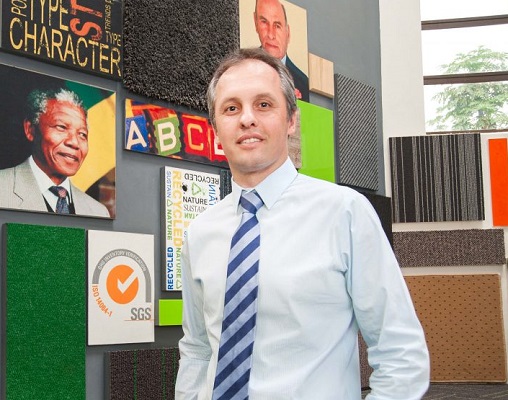South African manufacturers need a change of mindset – one that might even see competitors working together to develop synergies and niche markets, says Dr Mehran Zarrebini, chairman of PFE Extrusion which manufactures polypropylene staple fibre and bulk continuous filament (BCF) yarns in Hammarsdale KwaZulu-Natal.
It is this shift that has seen production at PFE Extrusion grow by 25% during 2018 despite the fact that the main sectors it supplies – flooring and construction – are under severe financial pressure.
In a similar way, Zarrebini adds that PFE Extrusion has worked closely with both existing and potential clients to research and develop new applications for their products and, in the process, its yarns.
“Working closely with clients to develop synergies is going to be the future of South African manufacturing. One of the biggest problems is that most manufacturing companies have an inside out mentality. You design and manufacture a product irrespective of understanding exactly what your client needs and then try to sell it. The most feasible approach is to go outside in. We need to look at what a client needs, what kind of problem he has and how we can produce a product to solve that. We need to identify our customers’ pain points. The manufacturer needs to adapt. We need to get on the same level as our clients,” he suggests.
When British holding company, PFE International, launched its extrusion business in 2006, this was not its mindset either. Instead, they wanted to secure the supply chain for the Van Dyck carpeting operation that was purchased in 2004.
“When we took over Van Dyck, they were importing their raw materials. We decided to vertically integrate the operation as we had experience in extrusion manufacturing and designing these products in the UK. We wanted to ensure that we were not reliant on imports and at risk of currency fluctuations. We wanted to ensure that our inventory costs were lower,” he explains.
The success story
The success story is an inspiring one. They chose a fairly isolated industrial area on the busy Durban Pietermaritzburg corridor that had once been home to a number of large textile mills. When that industry imploded, land was available at lower prices and existing infrastructure was well developed. The Zarrebini family also had a history of investing in the area.
He recalls how a building boom prior to the 2008 economic crisis meant that building materials were hard to come by and steel prices extremely high. The company discovered a building at a disused mine in Bloemfontein and then relocated and rebuilt it into the present plant in Hammarsdale.
They began to employ and train people walking past their new premises. Many are still with the company. Today, PFE Extrusion has a staff of 40 and operates 24/7.
It manufactures and markets up to 10 000 tons of staple fibre and 2 000 tons of BCF yarn annually. These are used to manufacture carpets and carpet tiles in its own Van Dyck Floors factory in Durban as well as for making geotextiles which are used to prevent soil erosion, filtration materials, automotive components, spun yarn, equestrian footing and concrete applications.
Whereas, initially 80% of production went to its Van Dyck Flooring factory in Durban, just 60% of a much higher output heads that way today.
At the time of investing, Zarrebini says the plan was to export fibre and yarns. Hence, they provided for a great deal of flexibility and additional capacity. However, much has changed. The polymer price – the raw material sourced locally from Sasol and Safripol – increased dramatically and the high price of transporting fibres and yarns to Europe and the United States made product noncompetitive.
“Initially, we didn’t focus on developing local our client base. However, as we’ve seen pressure grow in the flooring market, we have had to look at alternative industries to grow it. Other carpet manufacturers began to source their own yarns locally for the very same reason as Van Dyck – to minimize their inventory exposure and ensure less dependency on foreign currency. We have also worked with our geo textile customer base and with certain other niche manufacturers that utilize our fibre and yarns for products, he says.
The resulting economies of scale have increased the plant’s competitiveness and enabled it to look to further production increases. This has also renewed the future focus on exports, only this time not restricted to carpets.
“We’ve invested in ensuring that the plant is more efficient from an energy perspective to drive down unit costs. By increasing volumes, we are able to reduce our expenditure on electricity. We have also minimized waste which is one of the biggest negative factors that impacts an operation such as this,” he explains.

